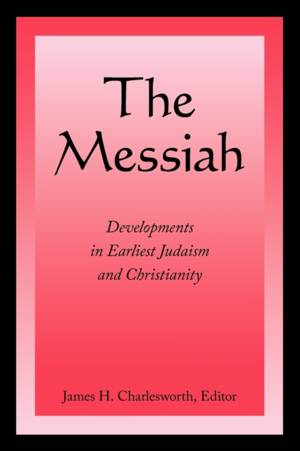
- Retrait gratuit dans votre magasin Club
- 7.000.000 titres dans notre catalogue
- Payer en toute sécurité
- Toujours un magasin près de chez vous
- Retrait gratuit dans votre magasin Club
- 7.000.0000 titres dans notre catalogue
- Payer en toute sécurité
- Toujours un magasin près de chez vous
The Messiah
Developments in Earliest Judaism and Christianity
James H. Charlesworth
Livre broché | Anglais
72,95 €
+ 145 points
Description
The Messiah How did the Jews from 250 B.C.E. to 200 C.E. conceive and express their beliefs in the coming of God's Messiah? Why did the Jews closely associated with Jesus of Nazareth claim within ten years of his crucifixion in 30 C.E. that he indeed was the promised Messiah? An international team of prominent Jewish and Christian scholars discuss these and related questions in this volume that stems from the First Princeton Symposium on Judaism and Christian Origins. The book focuses on the historical and theological importance of the presence or absence of the term "Messiah" and messianic ideas in the Hebrew Scriptures, the New Testament, Philo, the Apocrypha, the Pseudepigrapha, Josephus, and the Dead Sea Scrolls. It clarifies the key issues to be discussed, illustrates the appropriate methodology shared by international experts, and concentrates on the perplexing questions regarding messianic beliefs in Judaism and Christianity before the close of the New Testament and the editing of the Mishnah. Contributors Hugh Anderson David E. Aune Matthew Black B. M. Bokser Peder Borgen F. H. Borsch James H. Charlesworth Adela Yarbro Collins Nils Alstrup Dahl W. D. Davies J. D. G. Dunn Robert G. Hamerton-Kelly Paul D. Hanson J. G. Heintz Martin Hengel Richard A. Horsley Donald H. Juel Burton L. Mack D. Mendels J. Priest J. J. M. Roberts L. H. Schiffmann Alan F. Segal S. Talmon J. C. VanderKam James H. Charlesworth is the George L. Collord Professor of New Testament Language and Literature and director of the Dead Sea Scrolls Project at Princeton Theological Seminary. He is noted for his research in Apocrypha and Pseudepigrapha of the Hebrew and Christian Bibles, the Dead Sea Scrolls, Josephus, the Historical Jesus, and the Gospel of John. He is a Founder and Veteran of the Enoch seminar and a member of the Advisory Board of the Journal Henoch. Religion / Early Judaism and Christianity
Spécifications
Parties prenantes
- Auteur(s) :
- Editeur:
Contenu
- Nombre de pages :
- 632
- Langue:
- Anglais
Caractéristiques
- EAN:
- 9780800697587
- Date de parution :
- 01-12-09
- Format:
- Livre broché
- Format numérique:
- Trade paperback (VS)
- Dimensions :
- 152 mm x 229 mm
- Poids :
- 825 g

Les avis
Nous publions uniquement les avis qui respectent les conditions requises. Consultez nos conditions pour les avis.






